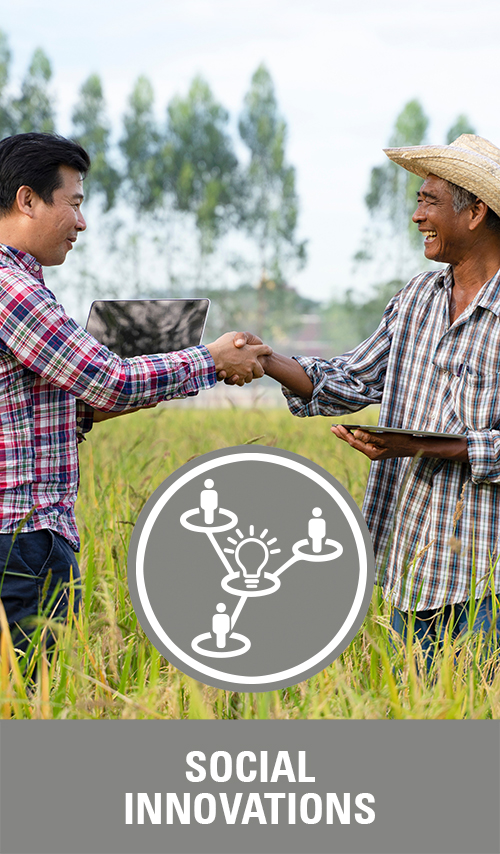Innovation for transformation of agrifood systems
Innovation (in agrifood systems) is used as a verb (to innovate) referring to the process by which individuals, communities or organizations generate changes in the design, production or recycling of goods and services, as well as changes in the surrounding institutional environment, that are new to their context and foster transitions towards sustainable agrifood systems for food security and nutrition. Innovation is also used as a noun to refer to the changes generated by this process. Innovation includes changes in practices, norms, markets and institutional arrangements, which may foster new networks of food production, processing, distribution and consumption that may challenge the status quo (HLPE, 2019).
Agricultural innovation is the process whereby individuals or organizations bring new or existing products, processes or ways of organization into use for the first time in a specific context in order to increase effectiveness, competitiveness, resilience to shocks or environmental sustainability and thereby contribute to food security and nutrition, economic development or sustainable natural resource management (FAO, 2019).
Innovation consists of doing something new and different, whether solving an old problem in a new way, addressing a new problem with a proven solution, or bringing a new solution to a new problem (UN Innovation Network, 2019).
News articles
In focus

Event
FAO Global Agrifood Biotechnologies Conference Biotechnologies for a Sustainable Future
16 - 18 June, FAO HQ, Rome
Biotechnologies for a Sustainable Future: Driving Agrifood Systems Transformation

Video
Harnessing AI: FAO's Vision for a Sustainable and Inclusive Future
Artificial Intelligence is transforming how we grow, process, and distribute food. From detecting pests to forecasting yields and optimizing resources, AI is making agrifood systems smarter, more resilient, and inclusive. The Food and Agriculture Organization of the United Nations (FAO) is leading this change.

Video
How FAO is harnessing biotechnologies for a sustainable future
This video highlights FAO’s efforts to accelerate agrifood systems transformation through biotechnologies. From low-tech solutions like biofertilizers to advanced tools such as gene editing, these innovations boost productivity, sustainability, and nutrition — while ensuring equitable access for all.
There are many areas of innovation, including:

Technological innovations.
Technologies are innovative when they are first introduced, adapted or used in a new way in a given context.
Technological innovations (including digital) can help achieve a new level of productivity, quality, diversity, efficiency and environmental sustainability in agrifood systems and accelerate progress towards achieving the SDGs.

Institutional innovations are new rules and ways of organizing the relationships between different actors in a system.
They take place when people and organizations (actors) strategically mobilize others through network relationships in order to repair or replace institutions.

Social innovation is defined as the development and implementation of new ideas (products, services and models) to meet social needs and create new social relationships or collaborations.
It represents new responses to pressing social demands, which affect the process of social interactions and is aimed at improving human well-being.


While there are many definitions, innovative finance helps to generate additional development funds by tapping new funding sources or by engaging new partners, enhances the efficiency of financial flows, by reducing delivery time and/or costs, and makes financial flows more results-oriented.
Innovative sustainable agricultural approaches, including climate-smart agriculture, conservation agriculture, integrated agriculture, agroforestry, and agroecology, offer opportunities to achieve, in concert, the dual aims of producing sufficient food and safeguarding the environment, while remaining mindful of challenges.
Agroecology is a participatory and action-oriented approach that embraces three dimensions: a transdisciplinary science, a set of practices and a social movement.
Agroecological innovations are distinct, by recognizing that food production, distribution and consumption inherently links economic, ecological and social processes, and includes market-based, institutional, policy-level, ecological, technological and social change with a focus on knowledge co-creation.









